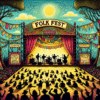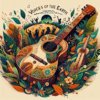Harmony in Simplicity: Why Acoustic Folk Music is Making a Resurgence

Introduction
In a world dominated by frenetic digital rhythms, autotune-laden tracks, and hyper-commercialized music, there’s a profound yearning for simplicity. Today, acoustic folk music is experiencing a renaissance, capturing the hearts of listeners who crave authenticity and emotional depth. As more people seek solace from the complexities of modern life, the mellifluous sounds of acoustic folk are resonating deeply, infusing new life into this timeless genre.
The Roots of Acoustic Folk Music
Acoustic folk music has its origins in the oral traditions of rural communities, bringing people together through storytelling. Emerging in the mid-20th century as a response to the political and social upheavals of the time, artists like Joan Baez, Bob Dylan, and Woody Guthrie used folk music as a vehicle for social change and personal expression. With its roots deeply embedded in everyday life and culture, folk music emphasizes organic instrumentation and sincerity, focusing on the essence of human experience.
The Characteristics of Acoustic Folk Music
See Also: Strumming Stories: The Heartfelt Lyrics Behind Indie Folk Hits
Strumming Stories: The Heartfelt Lyrics Behind Indie Folk HitsWhat sets acoustic folk music apart is its emphasis on simple melodies, emotionally evocative lyrics, and the authentic use of acoustic instruments—guitars, banjos, fiddles, and harmonicas. This genre thrives on harmony and storytelling, allowing musicians to connect with listeners on a personal and emotional level. Songs often tell poignant stories of love, loss, and hope, drawing listeners into a world where every note and word feels relatable, intimate, and profound.
The Modern Comeback
The Influence of Cultural Shifts
In recent years, the rise of acoustic folk music can be attributed to various cultural shifts. The impact of social media platforms, streaming services, and independent music channels has empowered a new generation of folk musicians to rise. Artists like Mumford & Sons, The Lumineers, and Ed Sheeran have incorporated folk elements into their music, bridging the gap between traditional sounds and modern tastes.
Moreover, the increasing awareness around mental health and well-being has led many to seek out music that provides a sense of comfort and grounding. Acoustic folk music’s soothing, raw, and straightforward nature delivers a unique healing power, making it an attractive choice for listeners navigating today's chaotic world.
See Also: Folk Fest Favorites: Top Artists to Catch at This Year’s Celebrations
Folk Fest Favorites: Top Artists to Catch at This Year’s CelebrationsThe Influence of Technology
While some may argue that technology and folk music exist in stark contrast, it has actually played a significant role in its resurgence. Platforms like Bandcamp and SoundCloud allow independent artists to share their work with a global audience, paving the way for diverse voices and stories. Additionally, the simplification of music production has made it easier for newcomers to experiment with folk sounds, leading to a flourishing of subgenres and innovative techniques.
Harmonious Connections: The Emotion Behind the Genre
Life's Authentic Experiences
The emotional connection that acoustic folk music fosters is rooted in its authenticity. Lyricists often draw from personal experiences, allowing listeners to relate on a profound level. As themes traverse existential crises, love stories, and even the beauty of everyday moments, the music transcends time and space. It stands as a reminder of humanity’s shared experiences—an acknowledgment that we all experience pain, joy, and longing.
Community and Collaboration
See Also: From Roots to Rhythm: Discovering the Essence of Contemporary Acoustic Folk
From Roots to Rhythm: Discovering the Essence of Contemporary Acoustic FolkAnother significant aspect of acoustic folk music lies in its embodiment of community and collaboration. Many folk musicians thrive on performing together, often gathering for jam sessions or open mics. This not only reinforces pastoral cultural ties but also reinforces the notion that music is a communal experience rather than an isolating one. Venues that host folk music often become gathering places where individuals unite in appreciation of the art, fostering a strong sense of belonging.
The Appeal of Simplicity in a Complex World
Finding Solace in Melodies
As life becomes more complicated with technology, clutter, and rapid changes, many are gravitating toward music that offers simplicity and solace. Acoustic folk music provides a welcome respite from the overwhelming saturation of modern soundscapes. Its gentle melodies and acoustic arrangements create a calm environment where listeners can reflect and reconnect with their emotions.
The Accessibility of Acoustic Folk Music
One aspect contributing to the resurgence of folk music is its accessibility. Unlike some other genres, acoustic folk is less reliant on heavy production, making it easier for aspiring artists to create music with limited resources. This democratization of music means that many fresh voices emerge, adding to the genre's dynamism and richness by bringing unique cultural backgrounds and experiences into the mix.
See Also: Voices of the Earth: Celebrating the Authenticity of Acoustic Folk Artists
Voices of the Earth: Celebrating the Authenticity of Acoustic Folk ArtistsConclusion
The resurgence of acoustic folk music signifies more than just a musical revival; it reflects a societal shift toward valuing authenticity, simplicity, and emotional connection in a fast-paced world. Whether through storytelling, communal experiences, or the soothing power of melody, folk music continues to resonate deeply with listeners, offering a space for reflection, healing, and shared humanity. Embracing the "harmony in simplicity," acoustic folk stands as a testament to the timeless appeal of genuine artistry.
FAQs
1. Why is acoustic folk music gaining popularity again?
The growing demand for simplicity and authenticity in music, along with the emotional connections people seek in their listening experiences, has sparked the resurgence of acoustic folk music.
See Also: Strumming Back to Roots: The Resurgence of Folk Music in Today's Soundscape
Strumming Back to Roots: The Resurgence of Folk Music in Today's Soundscape2. What are some notable contemporary folk artists?
Contemporary artists like Mumford & Sons, The Lumineers, Ed Sheeran, and Florence + The Machine blend folk elements into their music while maintaining mainstream appeal, bringing new audiences to the genre.
3. How does acoustic folk music promote connection within communities?
Acoustic folk music encourages collaboration among musicians, from local jam sessions to open mics, creating a sense of belonging and community through shared musical experiences.
4. Can anyone create acoustic folk music?
Yes! The accessibility of acoustic folk music means that anyone who has access to basic instruments and songwriting skills can create and share their music, contributing to the genre’s diversity.
See Also: The Folk Revival Movement: How Traditional Sounds Are Shaping Modern Identity
The Folk Revival Movement: How Traditional Sounds Are Shaping Modern Identity5. What themes are commonly explored in acoustic folk music?
Common themes in acoustic folk music include love, loss, social issues, personal experiences, and the beauty of everyday life. These relatable topics foster emotional connections between the artist and the listener.
If you want to know other articles similar to Harmony in Simplicity: Why Acoustic Folk Music is Making a Resurgence you can visit the category Folk.
